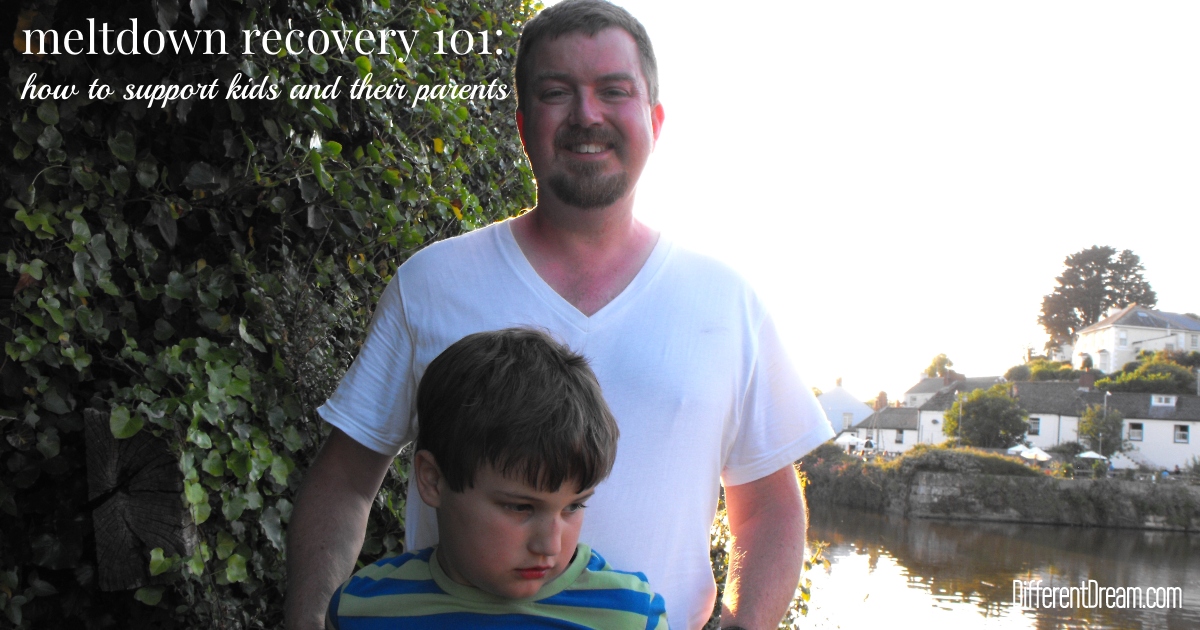Helping Autistic Children Recover from Meltdowns

Helping autistic children recover from meltdowns is something many assume only parents and professionals can do. Thanks to this post from Mark Arnold, members of the body of Christ can play a part is supporting autistic children and their parents.
Our son James had a meltdown the other day. It’s an experience that’s familiar to many families of autistic children. Like any autistic person, there can be a wide range of triggers when James has a meltdown. He may be overwhelmed by sensory input or frustrated that he can’t communicate something to us. It could be due to change of routine, feeling unwell or in pain, or that his iPad battery has gone flat!
When James has a meltdown, he isn’t behaving badly, pushing boundaries, or being difficult. It is brain overload, and there’s nothing he can do much about in that moment. But there is plenty we can do to support him.
The first thing we do is let him know that we will keep him safe. We assure him that he will be okay and that we love him very much. Sometimes we gently hold him while speaking reassuring words to him. Even if the words can’t make their way through the meltdown, the sound of our voices helps him. At other times, we need to give him a little space.
Next, we work with James to identify the cause of the meltdown. Once that is known we can help out and the meltdown will slowly lessen. The other day, the sound of a neighbor’s lawnmower. We couldn’t stop the lawnmower, so we shut the windows and significantly reduced the noise.
If the meltdown’s cause isn’t obvious and James can’t help us to understand it, we use calming techniques such as pressure therapy. We gently squeeze his thighs and arms, rub his back, or use a weighted blanket. Other coping techniques to try are a sensory chew, distractions, snacks, or a much-loved film or TV program. These help him regulate and slowly recover.
What is important to understand when helping autistic children recover from meltdowns is that coming down might take a while after the cause has been identified and fixed. The other day, James recovered from the more visible aspects of the meltdown after about 30 minutes, but it affected him for the rest of the day. We continued to reassure him that he was safe and cared for and had nothing to fear. We offered unconditional love. We let him rest and gave him the time and space he needed to recover fully. Once his recovery was complete, we learned from the experience and sought ways to minimize the trigger in the future.
A great way to understand meltdowns better is to talk with autistic adults about their meltdown experiences. We can ask what strategies they use to reduce the risk of meltdowns. No two people are the same, but we can learn from people that have been in similar situations. We can learn more about helping autistic children recover from meltdowns if we work together.
Do you like what you see at DifferentDream.com? You can receive more great content by subscribing to the monthly Different Dream newsletter and signing up for the daily RSS feed delivered to your email inbox. You can sign up for the first in the pop up box and the second at the bottom of this page.
By Mark Arnold
Mark Arnold is the Additional Needs Ministry Director at Urban Saints, a leading national Christian children’s and youth organization. He is co-founder of the Additional Needs Alliance, a national and international advocate for children and young people with additional needs or disabilities. Mark is a Churches for All and Living Fully Network partner, a member of the Council for Disabled Children and the European Disability Network. He writes an additional needs column for Premier Youth and Children’s Work (YCW) magazine and blogs at The Additional Needs Blogfather. He is father to James, who has autism spectrum condition, associated learning disability, and epilepsy. To find out more about how Mark’s work can help you, contact him at: marnold@urbansaints.org or @Mark_J_Arnold.
2 Comments
Submit a Comment
Subscribe for Updates from Jolene
Related Posts
Obedience: The Formula for Fall Blessings, Pt. 3
Obedience can be a difficult behavior to instill in children. But Amy Stout’s series on the topic can help.Today she shares ways kids can practice obeying.
Obedience: The Formula for Fall Blessings, Pt. 2
Obedience is the topic of guest blogger Amy Stout’s current series. Today, she’s back with tips for teaching the concept of obedience to kids.
Obedience: The Formula for Fall Blessings, Pt. 1
Amy Stout is here with strategies parents can use to teach children obedience. Today, she discusses first steps parents to take so kids will want to obey.






That’s why I started the website, Diane. Parents need lots of support.
Wish there had been a website like this when my James was young.